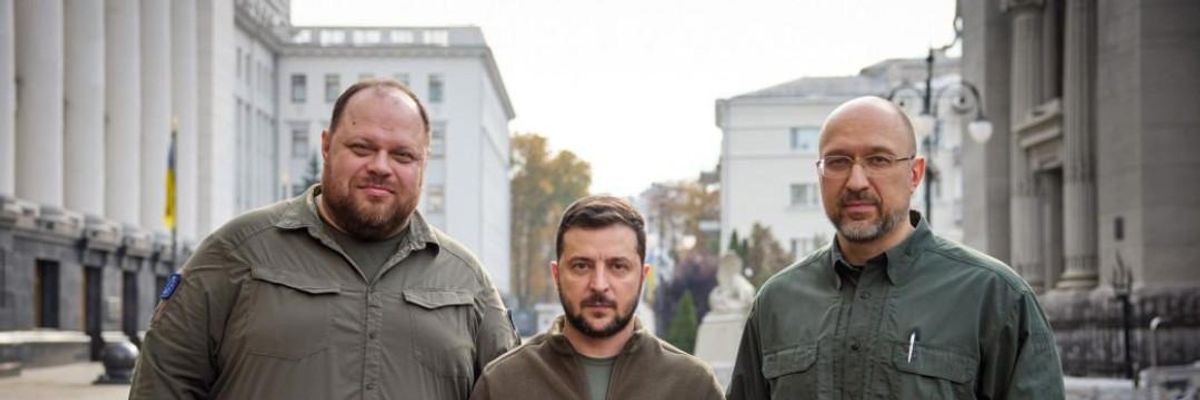Ukrainian President Volodymyr Zelenskyy on Friday formally applied for NATO membership after Russian President Vladimir Putin signed decrees to annex four Ukrainian territories, moves that signal the monthslong war is only escalating further amid growing fears of a nuclear conflict.
"De facto, we have already made our way to NATO," Zelenskyy said in a statement, making his case for officially joining the alliance whose members have pumped billions of dollars worth of high-tech weaponry into the war zone.
"If this cycle of escalation continues unchecked, then the prospect of direct nuclear conflict between America and Russia will become an active probability."
"We have already proven compatibility with alliance standards," Zelenskyy continued. "They are real for Ukraine--real on the battlefield and in all aspects of our interaction. We trust each other, we help each other, and we protect each other."
To succeed, Ukraine's bid for NATO membership must be accepted unanimously by alliance nations, an outcome that is currently seen as highly unlikely. If Ukraine were to become a NATO member, the alliance would be obligated to send troops to Ukraine to directly fight invading Russian forces, ushering in World War III and a direct clash of nuclear-armed powers.
"Will the world stand idly by as we careen towards nuclear apocalypse?" Medea Benjamin, co-founder of CodePink, asked in response to Ukraine's application for "accelerated" NATO membership.
The application comes months into what's devolved into a devastating war and a massive humanitarian crisis with no end in sight as major world powers--including the United States--fail to mount an effective push for diplomacy, despite widespread global support for an end to the conflict and the mounting threat of nuclear catastrophe.
In a "60 Minutes" appearance that aired Sunday, U.S. Secretary of State Antony Blinken claimed that peace talks have not resumed because "Russia has not demonstrated any willingness in this moment to engage in meaningful discussions."
"If and when that changes," said Blinken, "we will do everything we can to support a diplomatic process."
During a ceremony on Friday, Putin said he wants to resume peace talks with Ukraine but is not willing to negotiate over the four newly annexed regions.
Zelenskyy, for his part, said Friday that "we are ready for a dialogue with Russia, but with another president of Russia."
Anatol Lieven, director of the Eurasia Program at the Quincy Institute for Responsible Statecraft, wrote in a column Friday that "the very fact that direct peace talks between Ukraine and Russia are now so difficult means that the Biden administration must assume greater responsibility for diplomatic efforts to contain and limit the conflict."
"Not to do so would essentially be abdicating its responsibility to protect the United States and the American people from threats to their very existence," Lieven argued. "This danger is in no sense hypothetical or speculative. Both before and during the war, the Biden administration has responded to Russia's aggressive moves by increasing its support to Ukraine. At every point, the Russian government has responded not by backing down, but by further escalating in turn."
"If this cycle of escalation continues unchecked," he warned, "then the prospect of direct nuclear conflict between America and Russia will become an active probability."

